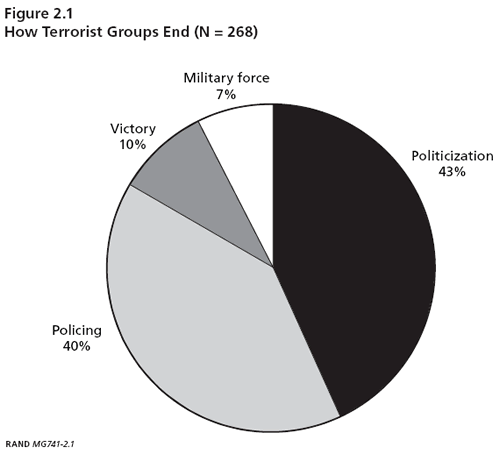To Defeat Al Qaeda, You Have to End the “War” on Terror
How Terrorist Groups End
According to How Terrorist Groups End, a paper put out by a certain group, military force is unlikely to stop Al Qaeda. “Which group?” you might ask, “Cindy Sheehan’s fan club? International Socialists? The League of Overeducated Underemployed Grad Students Who Hate Freedom?”
Nope. It’s the RAND Corporation. That’s RAND as in Research ANd Development, the global policy think tank first formed to offer research and analysis to the U.S.’ armed forces and now does thinking on social, economic, international and security policy. Their 2005 annual report says that about half their research covers issues of national security.
How Terrorists Groups End (which you can download for free and in full here) has this to say about the reasons terrorist groups end:
Terrorist groups end for two major reasons:
- Members decide to adopt nonviolent tactics and join the political process (43 percent), or
- Local law-enforcement agencies arrest or kill key members of the group (40 percent).
Military force has rarely been the primary reason for the end of terrorist groups (7 percent), and few groups since 1968 have achieved victory (10 percent).
“Sarcasm Tongs”
By the way, those sneering quotes (a.k.a. “sarcasm tongs”) around the word “war” in the phrase “War” on Terror? Those aren’t mine, they’re the RAND Corporation’s. The final chapter in their paper is titled Ending the “War” on Terrorism.
The Conclusion
I’ll close with the final section of How Terrorists Groups End:
The good news about countering al Qa’ida is that its probability of success in actually overthrowing any governments is close to zero. While bin Laden enjoys some popular support in much of the Muslim world, this support does not translate into the mass support that such organizations as Hizballah enjoys in Lebanon. This is not surprising, since there are few al Qa’ida social-welfare services, hospitals, or clinics. In 2005, Ayman al-Zawahiri urged Abu Musab al-Zarqawi to prepare for the U.S. withdrawal from the country by not making the same mistakes as the Taliban, which had alienated the masses in Afghanistan: “We don’t want to repeat the mistake of the Taliban, who restricted participation in governance to the students and the people of Qandahar alone. They did not have any representation for the Afghan people in their ruling regime, so the result was that the Afghan people disengaged themselves from them.” In addition, al Qa’ida continues to expand its list of enemies. It now includes virtually all Middle Eastern governments, Muslims (include Sunni and Shi’a) who do not share its views, Western governments, Asian governments (including Afghanistan, India, and Pakistan), the United Nations, and international nongovernmental organizations. Making a world of enemies is never a winning strategy.
But the bad news is that U.S. efforts against al Qa’ida have not been successful. They have now lasted longer than U.S. involvement in World War II. Despite some successes against al Qa’ida, the United States has not significantly undermined its capabilities. Al Qa’ida has been involved in more attacks in a wider geographical area since September 11, 2001, including in such European capitals as London and Madrid, than it was before that date. Its organizational structure has also evolved, making it a dangerous enemy. This means that the U.S. strategy in dealing with al Qa’ida must change. A strategy based on military force has not been effective. Based on al Qa’ida’s organizational structure and modus operandi, only a strategy based on careful police and intelligence work is likely to be effective.
“Police and Intelligence Work.” Where Have I Heard That Before?
If it sounds familiar, it might be because that’s the formula proposed by computer security expert Bruce Schneier, who’s been saying for a while that old-fashioned police work, not “security theatre” costing billions of dollars, is the key to countering terrorism.
It’s also what Noam Chomsky said:
Actually the fact that the terrorist act succeeded in September 11th did not alter the risk analysis. In 1993, similar groups, US trained Jihadi’s came very close to blowing up the World Trade Center, with better planning, they probably would have killed tens of thousands of people. Since then it was known that this is very likely. In fact right through the 90’s there was technical literature predicting it, and we know what to do. What you do is police work. Police work is the way to stop terrorist acts and it succeeded.
When the RAND Corporation and Chomsky agree on security policy, something’s going on.
Recent Posts
Sunday picdump for April 27, 2025
After a little break for a much-needed vacation, the Sunday “picdump” is back! Here are 246…
A reminder for April Fools’ Day
Have a good April Fools’ Day tomorrow, but be mindful about your pranking.
How NOT to sell a computer
As I’ve written before, I sometimes browse Facebook Marketplace for nothing more than pure entertainment,…
Sunday picdump for March 23, 2025
Another Sunday, another “picdump!” Here are 250 memes, pictures, and cartoons floating around the internet…
Sunday picdump for March 16, 2025
Another Sunday, another “picdump!” Here are 200+ memes, pictures, and cartoons floating around the internet…
Notes for the kakistocracy, 2025-03-10: Even Peter Zeihan says we might be the USSA, the danger of one-party states, JD Vance’s much cooler cousin, and why we need to be bold
A reminder: kakistocracy means “a state or society governed by its least suitable or competent…

View Comments
The pie chart is a peace sign - Cool.